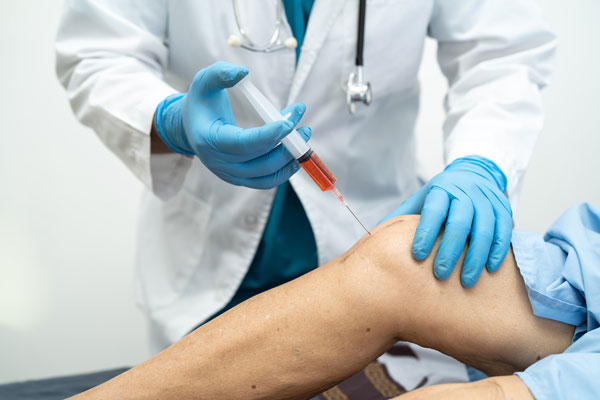
Steroid injections are lab-created medications similar to cortisol and are designed to mimic its actions in our bodies. We create cortisol in our adrenal glands and produce it in response to pain.
The term ‘steroid’ is short for corticosteroid and is in no way the same as the anabolic steroids used by bodybuilders to enhance their muscle growth and performance.
Steroids work to reduce inflammation in the body and dull or slow down your immune system, which is especially useful in rheumatoid arthritis, where your immune system is attacking your body and is causing painful inflammation in your joints.
How is a steroid injection given?
While your specialist can prescribe you oral steroid tablets, these are often less effective on joint pain than having a steroid joint injection. Oral steroids may not last as long in your system as a direct joint injection.
Asteroid joint injection is carefully placed into the affected joint by injecting into the bursae (the lubricating fluid sac that surrounds the joint and sits between the tendons and bones), or they may be injected into a soft tissue area around the joint.
Steroid joint injections treat problems such as:
- Rheumatoid arthritis
- Psoriatic arthritis
- Gout
- Sciatica
- Back pain
- Inflamed bursae (bursitis)
- Inflamed tendons near your shoulder, elbow, hip, knee, hand, or wrist (tendinitis)
Before you are given any steroid treatment, your specialist will assess your suitability by looking at your medical history, what medications you may be taking, your age and your physical activity level.
You will also need to undergo a thorough physical examination and have tests done to diagnose your inflammatory condition properly.
What are the benefits of steroid injections?
It can often be more beneficial to have steroid injections to treat an issue such as rheumatoid arthritis or another inflammatory condition because it will deliver a high dose of steroid medication directly to the problem area.
Steroid injections can be far more effective than oral steroid treatments because there is no guarantee that enough medication will directly reach and treat the inflamed area you are targeting. Steroid injections have been used for years as an effective treatment for inflammation to help relieve pain and swelling.
How long do steroid injections last?
When your specialist administers steroid joint injections, you will usually start to feel it working within a few short hours or up to 48 hours after the injection.
The pain-relieving effects of the steroid injection can last for several weeks or more, depending on the severity of your condition and the area being treated.
Most patients that receive steroid injections are asked to wait more than three or four months between treatments, but this could be longer depending on the severity of the returning symptoms.
Do not hesitate to contact Dr Naveen Bhadauria and his team to book a consultation if you feel that steroid joint injections may be of benefit to you.
How long does a steroid injection take to work?
Anyone suffering from joint pain will want to see it resolved as quickly as possible. However, how quickly a steroid injection takes to work will vary from person to person, and what medical condition is being treated.
Steroid joint injections are an effective treatment that will immediately start to reduce swelling and inflammation of the joint to lower or reduce the level of pain experienced.
The anti-inflammatory effect of the injected medicine helps decrease pain, but in most cases, people will start to feel noticeable benefits after about five days. However, some patients have reported feeling a positive effect the next day following treatment.
Individual responses to steroid injections
Corticosteroid injections can start to work very quickly in some patients, but they can be very different for another patient with the same condition. If you have a friend or family member that experienced rapid results from a steroid injection, it doesn’t mean that you will get the same fast results, even if you are being treated for the same health condition.
For some people, it can take a few weeks for their symptoms to improve, which can be down to the severity of their health condition or which joint is being treated. For example, someone receiving a steroid joint injection in their shoulder to help recover from a sporting injury may get very different results from an older person having their knee treated for osteoarthritis.
Article by Dr. Naveen Bhadauria



